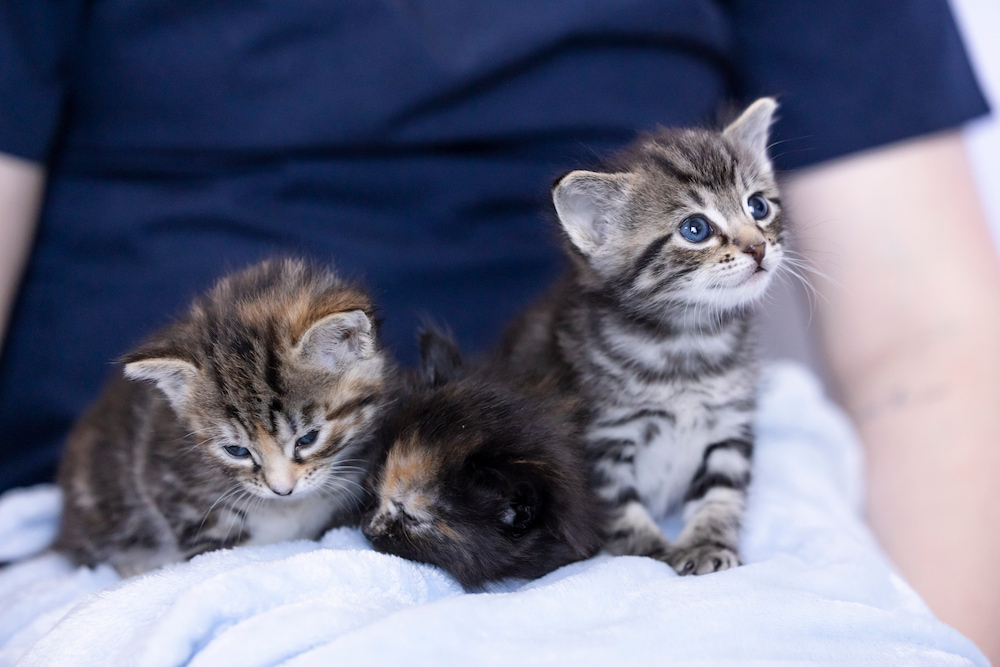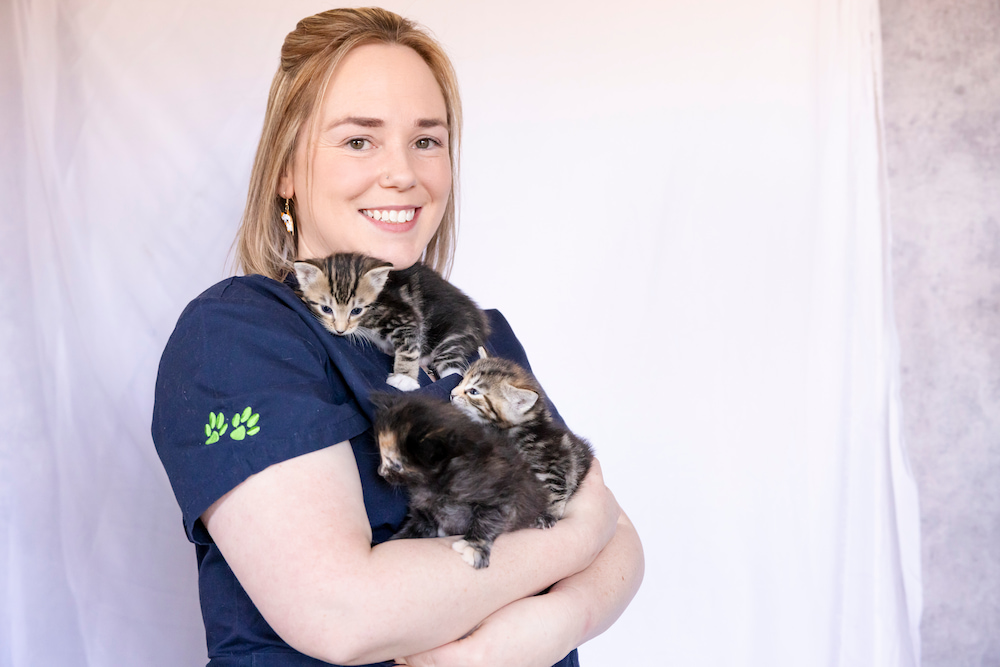The four kittens the RSPCA ACT’s Nikki Hohmuth is fostering are engaging little furballs. Only a month old, they wriggle and squirm, refusing to sit still for their portraits.
Cute as they are, they are something of a handful – and the RSPCA ACT is expecting hundreds more now kitten season has begun. (Pusses galore, one might say.) Over the next few months, the RSPCA will take in more than 1,000 kittens, many of them orphaned. They are looking for people to foster them, especially the newborns, as well as pregnant cats. (Carers for dogs are also sought.)
“If there are people out there who are able to be a volunteer, this is a time that we really need you,” CEO Michelle Robertson said.
“Often for both cats and dogs, it’s the animals that come in that need extra help, that need more socialisation, and sometimes a bit of respite getting out of the shelter.”
Kitten season typically runs from October to May. A queen (or female cat) can produce four litters during one season; since a litter is usually four to six kittens, that means a single cat may have up to 24 kittens each year. Kitten season has grown longer over the last couple of years, too; litters are still being born as late as August, which is not healthy for the mother or kittens.
Once kitten season ramps up, Ms Robertson said, the RSPCA will have 175 kittens in care at any given time. Last year, the most they had at any one time was 182 kittens, animal care manager Simon Yates said.
But they don’t have enough foster carers. Close to 200 volunteers have signed up, but only a handful care for neonates (kittens less than one month old).
These kittens are the hardest to foster, Ms Robertson said, because they need so much care.
They are tiny, and some are so small they can fit into the palm of your hand. They cannot regulate their own body temperature; they need to be fed every two hours; and in some instances, they need toileting.
“It’s incredibly hard work, but incredibly gratifying, because you are literally saving that little kitten’s life, and enabling that neonate to grow into a kitten, to grow into a beautiful cat, and to live a good life,” Ms Robertson said.

The perfect foster carer is someone who works from home, or is at home a lot.
Nikki Hohmuth said her mother started fostering animals after her husband died.
“My mum gets a lot out of it. She really loves it, and I think that gives her a bit of purpose. My dad passed away a few years ago, and then her first litter of kittens after that was really special for her. It gives her something to do with her time, and her way to give back. She’s adamant about buying everything for our kittens. We don’t take anything from here [the RSPCA]; she buys all their food and their litter. It’s like her supporting RSPCA as well as feeling like she’s in it and actually making a difference for the animals. And it’s really fun!”
The four kittens Ms Hohmuth is fostering now, and their mother, were found in Kambah and taken to the Weston Creek shelter. She says their mum does most of the work (including teaching them how to use the litter tray). They are just starting to eat baby food.
“I put some on my fingers, and stick it in their face; they struggle on it more than anything else, but they’re slowly becoming like miniature cats. … Some of them, especially the big fat one [named Womp – all four’s names start with ‘W’], will find it on their own, but some of them need more encouragement than others.”
The kittens are still feeding off the queen; they get immunity through her milk. But they will soon start weaning, so need their own vaccinations. They get dewormed every two weeks, and have been microchipped and vaccinated. They won’t be desexed for another month, until they are eight weeks old.
“That’ll give them time to learn how to be a cat, get a personality, and have all their vet work,” Ms Hohmuth said.
“We get to do a lot of fun stuff at this age, just getting them used to different environments, different noises, different textures. I try to handle them as much as I can to get them used to that as well. But the fun will begin now I get to play with them.”
Two more kittens (a month older) were desexed the day Canberra Weekly visited the RSPCA. They were advertised on the weekend, and Simon Yates expected them to be gone within a couple of hours of their being advertised.
All the kittens the RSPCA fosters will be offered for adoption.
“Rehoming kittens, despite how many we get, is never a problem,” Mr Yates said. “We often think that there’s got to come a point when the market is saturated, so to speak, but it’s never happened. They all find homes.
“They’re easier pets to look after [than dogs] in the sense that they’re contained. You don’t need to have exercise routines. With puppies and dogs, you need to have a lot more interaction, whereas cats are a bit more independent.”
It’s not just cats that the RSPCA offers for adoption, though. At the end of last week, Mr Yates said, there were more than 170 animals in care: 72 adult cats, 24 kittens, 35 dogs, 11 roosters, 10 birds (including parrots and pigeons), eight rabbits, guinea pigs, and rats. (And a wild wombat.)
All animals the RSPCA sells are desexed and microchipped, healthy, temperament tested, and have been checked for fleas, ticks and worms.
The RSPCA urges the public to desex their cats to reduce unwanted litters and prevent overpopulation. During the last kitten season (October 2022 to this May), 160 stray female cats came into the RSPCA – they could have produced 3,840 kittens over those eight months.
Cats should be confined to the owner’s premise, as ACT laws require, both for their own safety, and to avoid harm to wildlife.
“It doesn’t necessarily mean that a cat is just inside your house,” Ms Robertson said. “It just means that the cat isn’t free roaming, because it’s better for the cat.” Too many cats, she said, are struck by cars; get into fights, and are badly injured or infected; or predate on wildlife. She advises keeping cats contained, putting cat runs in the home, and taking cats for walks on a leash so they can explore – without devouring birds.
Owners should also microchip their pets – the best way to reunite them with lost animals quickly. About 70 per cent of the animals that come into the shelter are not microchipped, Ms Robertson said.
The RSPCA asks people to adopt from a reputable place like them, rather than shopping. Owning a pet has physical and mental health benefits, Ms Robertson noted, while rescuing an animal also gives the owner bragging rights.
“Those animals didn’t choose to be abandoned; they didn’t choose to be born on the street,” Ms Robertson said.
To volunteer to be a foster career for kittens, or to adopt an animal, visit rspca-act.org.au



